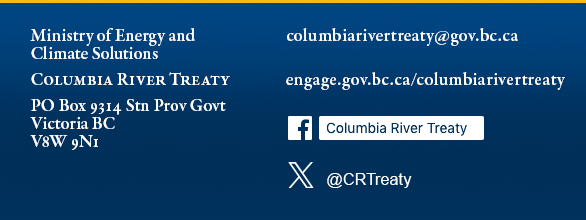Columbia River Treaty
Edition: May 2020

Improving Ecosystem Function in the Upper Columbia Basin
May 28, 2020
The Upper Columbia Basin Environmental Collaborative (UCBEC), a partnership of provincial, regional and local environmental organizations from Canada’s Upper Columbia Basin (UCB), recently released an updated Discussion Paper outlining its proposals for improving ecosystem function in the UCB.
UCBEC’s primary focus is to improve the function of Canadian ecosystems impacted by dams and reservoirs in the Columbia Basin, including those in terrestrial, aquatic and riparian/wetland realms. The group is involved in a range of collaborative initiatives, both governmental and non-governmental, and has presented technical proposals at numerous conferences and workshops to expand public discussion on improving ecosystem function in the UCB.
UCBEC sees ecosystem function as the combination of all processes in an ecosystem and how they work together, and ecosystem services, a subset, recognized as beneficial to humans. Ecosystem function has been impaired in the UCB due to severe impacts from dam construction and operations. Processes affected include primary production, reproduction, migration, and production of upland, riparian, wetland and aquatic habitats for ungulates, birds, reptiles, amphibians, fish and invertebrates. UCBEC’s emphasis on improving ecosystem function signals a desire to restore these basic ecosystem processes wherever possible.
UCBEC’s premise is that historically, ecosystems have been simplified to maximise availability of specific ecosystem services, leading to a decrease in other functions. In seeking restoration of ecosystem function, management refocusing should start at the basic level of primary production, move up trophic levels to production of a wide range of habitats, to eventually address the full complement of species
In their updated Discussion Paper, UCBEC describes general and specific measures for returning improved ecosystem function to both the Kootenay and mainstem Columbia systems. UCBEC proposes that, in addition to establishing ecosystem function as a third primary purpose of the Treaty, active adaptive management and adjusted governance will be required to address the many unknowns associated with changing social and economic priorities and the growing challenge of climate disruption. For the twelve identified water bodies, the updated paper presents proposals for further studies and changes to dam operations that could improve environmental values in the Canadian portion of the UCB.
The updated Discussion Paper and other UCBEC publications and presentations can be found at: http://www.kootenayresilience.org/columbia-river-treaty


